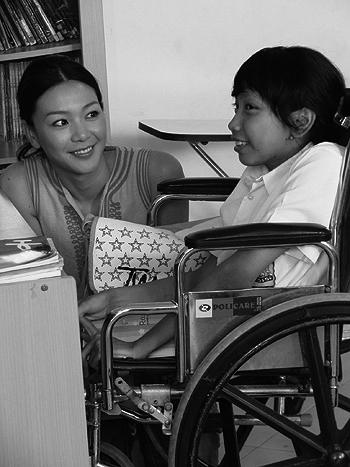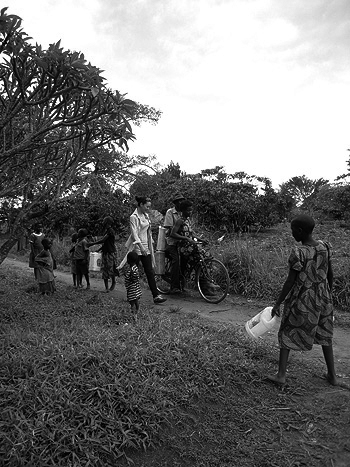Japan's Official Development Assistance White Paper 2009
Column 21 Helping People to Help Themselves
— Ms. Kurara Chibana —
• Q: As the navigator of Earth Supporter, you have many opportunities to see the sites of Japan's international cooperation initiatives. What do you think of what you have seen so far?
• A: I have been very much interested in charity activities and international cooperation for a long time, so the program has really given me lots of valuable experiences. I have covered five countries so far, namely Uganda, Vietnam, Cambodia, Thailand, and Indonesia; I have felt very close to Japan's international cooperation activities.
In Uganda, I observed the New Rice for Africa (NERICA) project. One of the experts for the project was known to the people there as "Mr. NERICA." I was truly moved by Mr. NERICA's struggle to improve the lives of the local people through the promotion of rice cultivation. Also, the words of a Japan Overseas Cooperation Volunteer whom I met at a care center for disabled children in Vietnam was impressive. " It's more important to first show yourself working hard rather than trying to instruct and communicate to the people." Hearing these words, I remember thinking to myself that I too want to do something for the world – but what exactly can I do? I hope to learn more which direction the world is moving in and think about what the people of the world really need.
• Q: Which country has left the biggest impression on you?
• A: When I interviewed the principal of a NGO-run school for the disabled in Indonesia, it was very impressive when he said, "This school was built with aid from Japan, and thanks to this aid, the students have begun to have more pride in themselves." When there was no educational facility for disabled children in the region, many children could not go to school and had to stay home all day. But after the school was built, going to school everyday energized the children and kept them active. I can't describe how happy I was to hear that the construction of the school had brought about such a change in the children.
Through the program, I was always encouraged by the scene of Japanese people actively engaged in developing countries so far from their homes; and when I saw those Japan Overseas Cooperation Volunteers, senior volunteers, and experts integrate themselves deeply into local communities.
• Q: What are your expectations for Japan's international cooperation in the future?
• A: The more I learn about international cooperation, the more I feel that it is necessary. But at the same time, I also realize how difficult assistance really is. I feel it's not easy to "help a country to help itself." However, the diligent and sensible way in which Japanese consider the feelings and needs of the locals is effectively bringing about positive change in the field. Perhaps more than simply giving assistance, we have to think about our efforts in the long-term to provide assistance which helps the people of the countries we assist to stand on their own feet.
I hope to continue to convey to the public what I see and feel as I observe Japan's international cooperation efforts.

Ms. Chibana at a school for the disabled in Indonesia. (Photo: Earth Supporter)

Ms. Chibana visiting a farming village in Uganda. (Photo: Earth Supporter)
